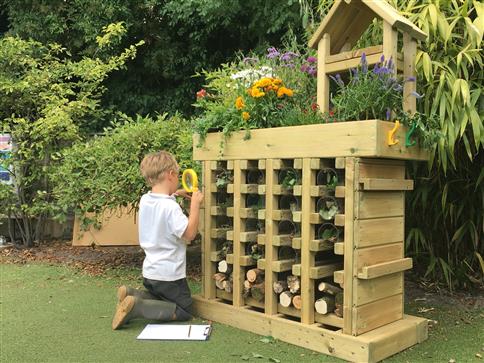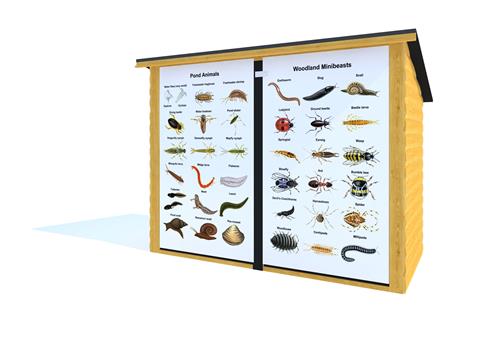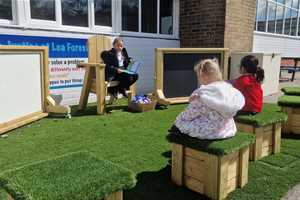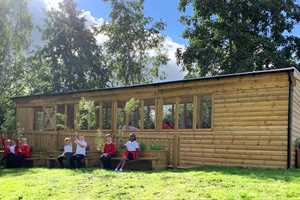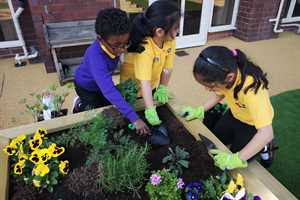
Outdoor Learning and Play
The Benefits of Having a School Garden!
A school garden can expand children’s understanding of the natural world whilst helping them engage in outdoor play.
Pupils will become familiar with the types of plants, flowers, fruit and vegetables that they can grow as they learn to appreciate the wonders of nature. School gardens are fantastic outdoor resources for your school to have.
How School Gardens Can Benefit Your Children
Caring for a school garden requires teamwork as groups of children work together to achieve a shared goal. Pupils will learn to communicate well as they delegate responsibility when caring for their own produce.
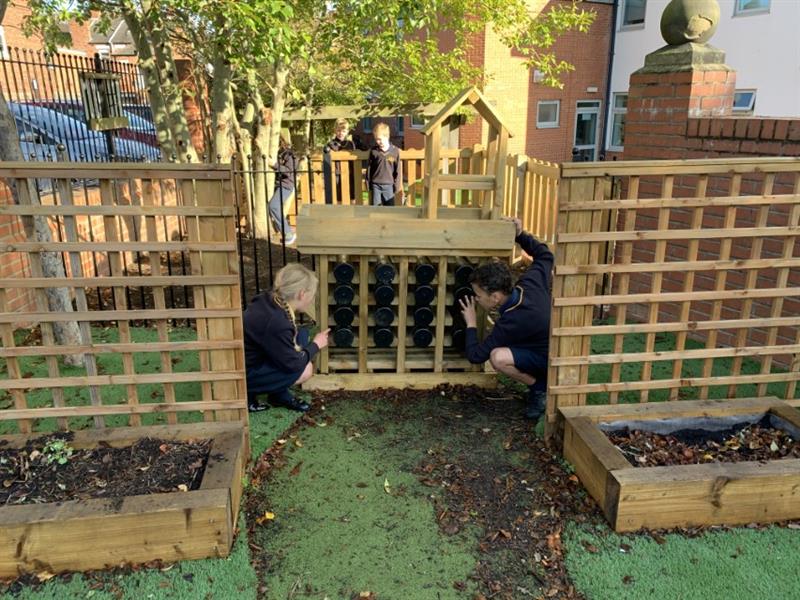
Planting and tending crops requires patience and can provide a calming environment for pupils to grow their social skills and learn positive behaviours such as sharing, turn taking and respect.
A school garden gives children the opportunity to become decision makers and helps them to become independent learners.
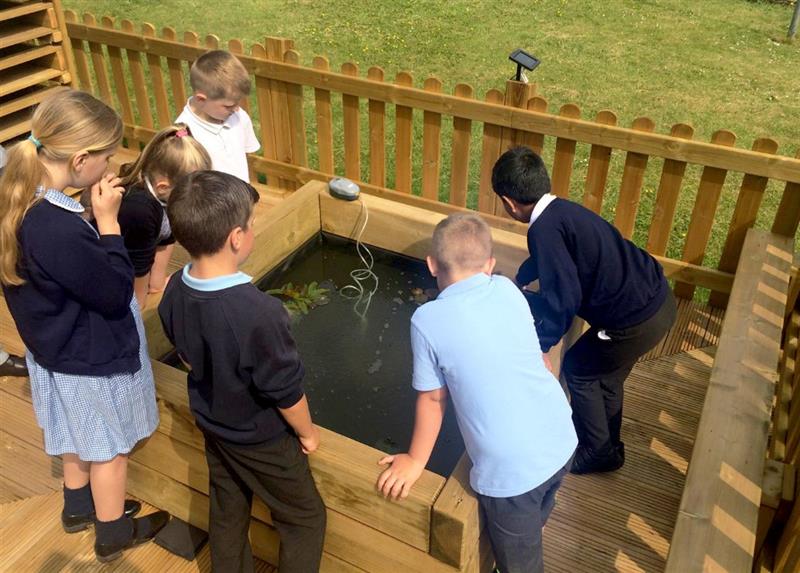
When people ask for school/EYFS outdoor ideas, we always recommend school gardens. All of these benefits make school gardens a great way to get your children involved with outdoor provision and play, helping them develop into well-rounded kids and adults.
Healthy Eating and Nutrition
With more children leading sedentary lifestyles and an increase in childhood obesity figures, a planting area can help to encourage healthy eating and physical wellbeing.
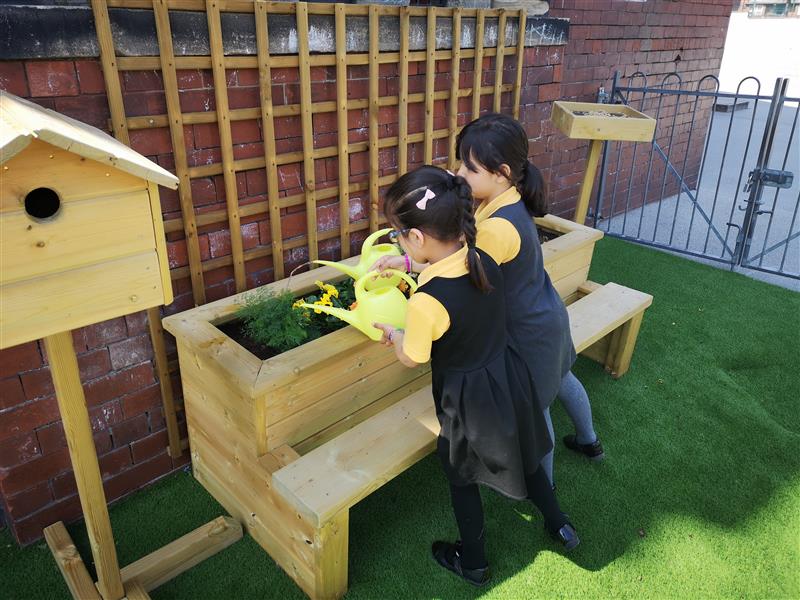
A school garden can be a great resource for introducing children to new foods and involving them in learning a range of skills when cooking.
Children love observing how different foods are grown, giving them hands-on experience, which will encourage them to try new foods in school and also at home.
For many children, seeing where their food comes from will promote engagement and enthusiasm. Pupils may need to wait weeks or months for their food to grow which will give them a real sense of achievement, they will feel connected to the food they have grown and may be more open to trying new tastes.
A Place for Physical Activity, Outdoor Play and Exercise
Gardening for schools provides children with a safe, meaningful space to develop physical ability.
A school garden becomes a place of pride and enjoyment where children eagerly participate in gardening skills.
Children stand, walk, kneel and stretch as they tend to their plants. Tasks such as raking, digging holes, pruning and pushing a wheelbarrow develop endurance, flexibility, balance and strength. In addition, spatial awareness is improved as children are carefully navigating the environment.
Complex fine and gross motor skills can also be developed as children plant tiny seeds, pick produce, weed the garden beds and learn how to tie plants to canes.
This form of outdoor play and outdoor provision provides numerous physical benefits for children and keeps them engaged and excited to come back to the garden in the future.
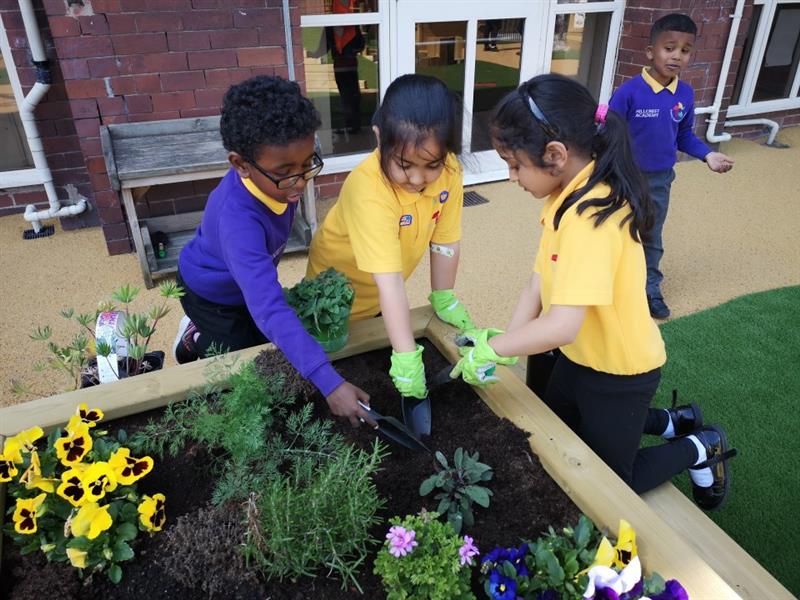
Connect to the Community
A school garden can be a place for the whole school community and can be utilised by every year group. Pupils can be involved in many of the important decisions when starting to create their garden.
They will need to think about the location, plot out the dimensions and consider what types of produce and vegetation can be successfully grown in each season.
Links to the wider local community can be made by inviting staff from local garden centres/ community groups or children’s family members into school to offer advice and work with pupils. Interaction across generations helps children to cooperate and to grow interpersonal skills.
Produce can be sold to parents at school fairs and events which helps to develop children’s mathematical skills and knowledge of profit.
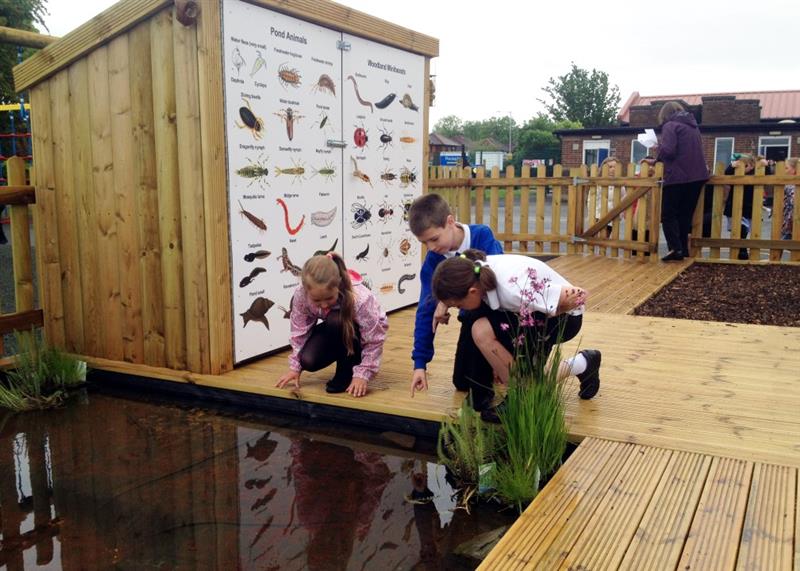
School Gardening clubs can include pupils from different age groups which can encourage friendships and conversations that wouldn’t normally happen throughout the school day.
A gardening club could work together to achieve a common goal such as selling produce to raise funds or providing entries for Flower Shows. This would help to develop a sense of real pride in the school environment and encourage pupils to persevere.
- Giving pupils awards in assemblies to celebrate achievements in the garden.
- Showing pupils which foods have been grown and presenting them as a choice at lunchtimes.
- Organising events where family members are invited to come and work in the garden alongside pupils e.g. ‘Father and Son Gardening Afternoons’
- Inviting families into the garden regularly whether as part of open days, summer fairs or after-school events to sell or serve produce.
School Gardens can also act as sensory gardens for children, offering a safe and relaxing space for emotional regulation and calming.
Outdoor Learning Environment
Active learning in the outdoor garden helps children to become attentive and motivated to learn. Observational skills can develop across the seasons as children learn to study leaves, flowers, seeds, roots and bulbs through first-hand experience.
Magnifying glasses can be taken to the Sorting Table where different vegetation can be compared and contrasted. Pupils can draw scientific diagrams of the plants they have grown, developing an understanding of plant structure.
Children will learn about the conditions plants need to grow and can set up their own investigations to gather evidence. They may decide to give the same plant species different amounts of light, water or fertiliser.
Greenery can be measured as they grow and leaves can be counted. Pupils will begin to realise that every part of a plant has a job to do.
.jpg)
A Bug Hotel allows children to observe insects throughout the school year. The Bug Hotel is fantastic for teaching children to identify and name different species and will learn how to keep creatures safe whilst studying them.
Pupils will be able to sort and classify animals and describe the conditions of different habitats through first-hand experience, making this outdoor play session informative and memorable.
In Geography lessons, children may compare the produce that they grow with items that can be grown in other parts of the world. Curriculum links can also be made to History topics, pupils could create their own Roman garden by learning how to grow herbs such as thyme, mint and basil.
In Literacy lessons pupils can focus their studying around the school garden by reading nature themed stories and information on seed packets. Instructions about how to grow produce can be written as well as letters to community members informing them about work undertaken in the outdoor area.
A school garden can be a great stimulus for writing imaginatively which could include stories, riddles and poems. Reluctant writers may find the garden a meaningful source of inspiration when writing descriptions and recounts.
.jpg)
The amount of learning opportunities from the garden makes it a fantastic outdoor learning environment for encouraging children to engage and interact with natural environments as well as learning academic subjects.
Understanding Sustainability and Environmental Issues
When children experience the process of growing fresh produce, they learn first-hand the connection between the environment and their own food supply. Pupils will begin to feel closer to the world and have respect for the environment.
Pentagon’s Recycled Composter helps children to see the importance of recycling as they turn food and garden waste into fresh compost for their flower beds. The Composter itself is made from recycled components which could generate important discussion about why we recycle materials.
A water butt would be another great resource to use alongside a school garden that would allow children to collect recycled rain water and help to gain an grasp of the water cycle, making it a great teaching tool for teaching children about sustainability.
Helping children understand the importance of the environment can help children have a love for the world around them, which can influence children to take part in more outdoor play sessions.
The Impact of Gardening on Behaviour
Studying in outdoor areas that are surrounded by a natural environment can motivate pupils and have a positive impact on behaviour and attainment. Being outside and taking part in outdoor play can be much more enjoyable for classes than being in a large classroom or school hall.
As children become absorbed in gardening tasks, they may lose some of the inhibitions which they feel indoors and will be able to communicate freely with increased confidence.
Product Spotlight
School Gardens can improve children’s self-confidence and self-esteem, when children feel better about themselves and proud of their achievements, disruptive behaviour will often decline.
Resilience is needed as often crops will fail or will not grow as well as expected and children will need to be determined to problem solve and try again.
Pupils will feel a huge sense of pride when talking about their school garden therefore they will want to maintain it. Older pupils may develop self-assurance when explaining the rules of the garden to younger pupils, ensuring that crops are allowed to grow without disturbance.
School gardens can create a positive, calm environment for both staff and pupils. A garden gives space for movement, freedom for discussion and provides a peaceful sanctuary away from technology.
Pupils are given the chance to really listen, to be quiet and reflective, making it a fantastic form of outdoor provision and play.
Gardening is a practical, hands-on process which can appeal to the visual and kinaesthetic learning styles of many SEN pupils. As pupils become familiar with gardening tasks, they will begin to show improved patience and concentration. Children can choose whether to work individually, in pairs or as a team allowing them to set their own space and pace to develop.
A sensory garden stimulates sensory awareness and allows children to experience textures, sights and sounds, they may otherwise not be exposed to. A garden can provide a non-threatening environment which helps to relieve feelings of stress, anger and frustration.
.jpg)
Creating the Perfect School Garden for you!
Pentagon has a wide range of natural playground equipment that can create a school garden oasis! Lack of available space does not present a barrier to gardening as Pentagon’s range of imaginative and innovative planters also provide playground seating and plenty of opportunities for imaginative play and studying.
A garden doesn’t have to consist of grassed areas and trees, it can be made using raised beds and planters. Planting Trees are a fantastic product that allow for every child in a class to be fully involved in the growing process, providing an ideal solution, if outdoor space is limited.
Top Tips when planning for a School Garden
At Pentagon Play, we've had the pleasure of working in over 15,000 different settings. Along the way, we've learned what makes an effective school garden and created these handy tips to help you utilise your school garden and how you can make it a very effective outdoor learning environment.
Form A School Gardening Club
Form a school gardening team including staff, pupils, parents and local volunteers. Set clear goals for the focus of the garden and how it will evolve. A rota could be established, giving different classes and groups of children allotted times.
Choose the right location
Pick the right spot in your school ground. Perhaps choose outdoor areas which are underutilised but also take climate and sunlight into consideration. The condition of the soil should be taken into account and perhaps an area of shade could be created by installing a canopy.
Consider the size of your garden
Consider the size of your school gardening area. Would the green space accommodate a secret garden gazebo or would several sleeper planters suit the area? The garden will need to be accessible to all students therefore ramp access may be required. A Raised bed or paved areas allow children to move around the area safely.
Choose your crops
Consider which crops to plant, including a mixture of those which grow quickly and others which require patience. Decide which vegetables, fruits and herbs can be grown and think about which shrubs will attract wildlife.
Link it to lessons
Plan for how the garden will support studying in different curriculum areas making links to knowledge and skills.
Start Your School Garden Today!
Gardening can teach children a variety of abilities and make a major contribution to some pupil’s lives by giving them a real focus and providing many benefits. Children learn to interact with and learn from nature in a relaxed setting.
In today’s fast paced world, a school garden can provide a sanctuary where the wonder of Mother Nature can be appreciated. Pentagon Play can provide your pupils with a garden full of possibilities for outdoor learning and direct experience of nature.



